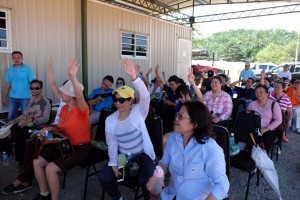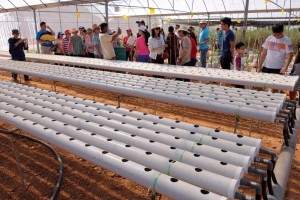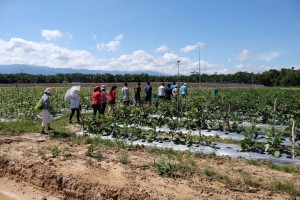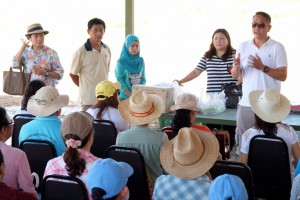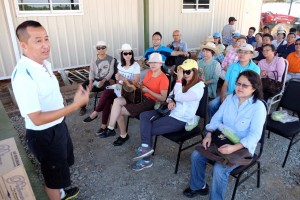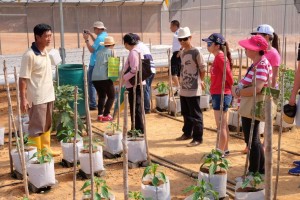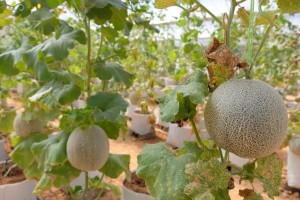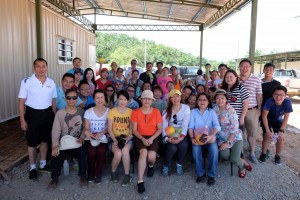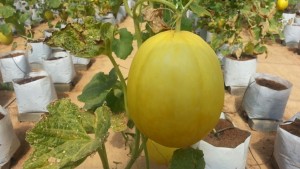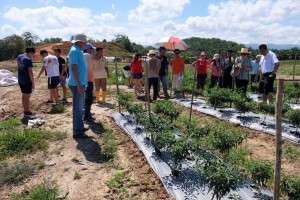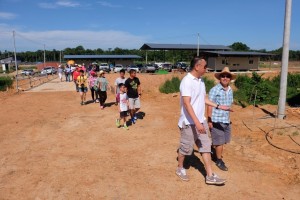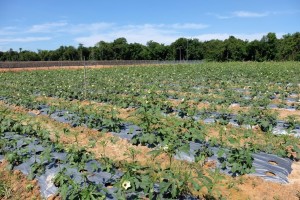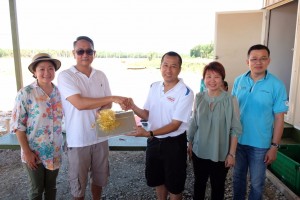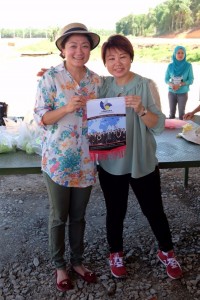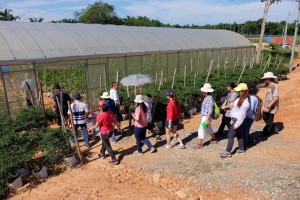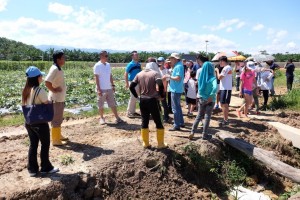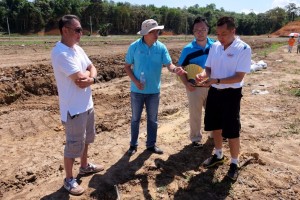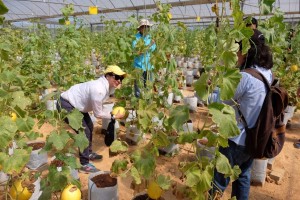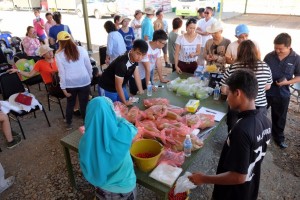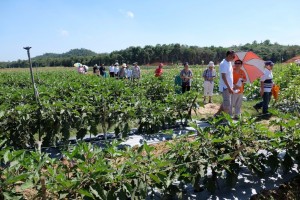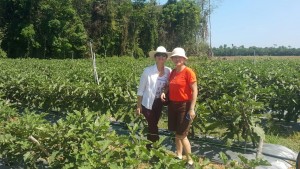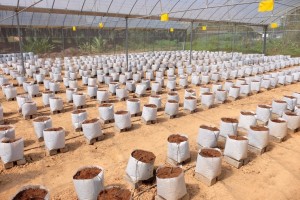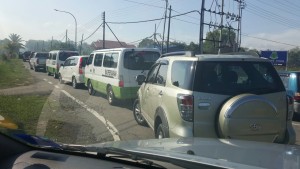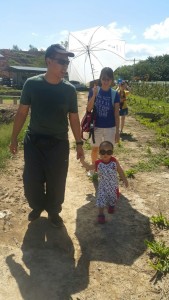“We will depart at 7:30am on the dot from KK, not a second later!” That was the strict instruction given to us from organiser Boris before our educational trip to Tao Guan Eco Farm in Kimanis on 17 April 2016.
We came prepared with our hats, proper walking shoes and drinking water as directed and the convoy of around 40 people arrived at the farm just before 9:00am after a brief stop at the petrol station about 15 minutes away from the farm for all to meet up.
The tour was organised by the Food Security Interest Group of the Sabah Tshung Tsin Alumni Association headed by Boris Soon and Chung Chin Hing who both hold the capacity as the advisors of the Agricultural Club of our old school, Sabah Tshung Tsin Secondary School.
Tao Guan Eco Farm, owned by another fellow alumnus, Tay Yee Chiong was established in July 2015 as we were briefed before the tour. Their vision is to establish a brand name for the vegetables and fruit produced and supplied from the farm to the local market as it has been noticed that there are no specific and recognised local brands for the produce so far.
As the farm is less than a year old, their methods of cultivation on the land where the farm is situated and the chosen vegetables are still at the infantile and experimental stage to determine if the vegetables and fruit are suitable to be grown in larger scale in the area and if there are markets for these particular types of produce. We were informed that although it is still not feasible to go into full scale organic farming locally at this moment in time, they made it their eventual goal to flourish and be successful in this particular field.
Despite of the inability to go into complete organic farming at this stage, the team is not deterred from adopting the organic ways of farming from the beginning such as using organic fertilisers in order to produce cleaner and safer to consume vegetables and fruit than most. The usage of chemicals, i.e. pesticides and herbicides is minimised by setting up huge greenhouses that are not solely for the purpose of experimental cultivation of certain types of melons or vegetables but also to deter insects from devouring the plantations. In addition, chemicals will be administered only when and where necessary and it was stressed by Jackie, the manager of the farm that only branded and high quality chemicals that are certified by the Malaysian agricultural bodies are used.
After the briefing our first visit was to the greenhouses and Jackie warned us not to linger for too long but to walk faster as he was afraid that we might not be able to bear the heat. Greenhouses in the tropical heat? Yes, it could be a little overwhelming!
The fruit and vegetables are planted in pots filled with cocopeats in the greenhouses. They are irrigated with the fertigation method incorparated with fertilisers injected into the water in the drip irrigation system.
We were greeted by pots of neatly arranged artificially pollinated jade melons being trailed vertically before we were impressed further by the cherry tomato trees that were flooded with readily harvest fruits. We were also given a detailed introduction to the soilless and continuous-flow nutrient solution culture, hydroponics in one corner of the greenhouse.
We listened to the explanation, be awed by the production though in a small scale and the vision of growth that will happen in the very near future given time, and at the same time grabbed all the phone-photography opportunities despite of the intense heat that had caused everyone to experience a sauna moment.
After the tour of the first greenhouse we were ushered into the second greenhouse that were filled with jade and rock melons. All were impressed by the amazing looking fruit and we were told that even at this stage, the team manage to harvest the melons every 3 weeks and sell them to “Pick & Pay”, a local food supermarket. Their goal is to improve on the present production so that they can harvest every week and to achieve at least 1.5 tonne per harvest to ensure a constant supply of the high quality melons locally.
The next tour is the vegetable fields and though we would be going under the hot sun, it felt good to be out in the open than the confined sauna-like greenhouses.
It was a wonderment to notice that a lot of these urbanites were never exposed to the vegetables in their natural form, meaning how they look like on the plants and also what the plants and flowers are like. They now know cucumbers, bitter gourds and white morrows are climbers and how amazing they look when hanging on the plants trailed vertically along wire frames. They also learned that lady’s fingers/okras have big light yellow beautiful flowers and one plant can bear many fruit. Many of them exclaimed in delights when they spotted the aubergines hiding among the leaves.
After the wander in the open field we were welcomed back to the shed with drinking water provided and another Q&A session followed. Questions were asked and answers were given expertly by Jackie who even spared time to give us a very general introduction to organic farming, which was an eye-opener to many of us.
Before we departed from the farm, we manged to get the team there to pick some melons, lady’s fingers, bitter gourds and cherry tomatoes freshly from the farm to sell to us. As the vegetable production is not big, the farm at the moment supplies them only to a few vegetarian restaurants in KK as well as a vegetable shop in Dah Yeh Villa.
It was a valuable short outdoor lesson for us on eco and organic farming. We were impressed by how the team led by Jackie has managed to grow vegetables on the field of infertile soil and we were assured that after this first season of planting and with the bugs, earthworms and useful organisms coming in, the soil of this piece of land will be kept alive and in time, we will see more plants being planted and there will be bountiful harvest. We wish them all the best!
We would like to express our sincere gratitude to Tay and his team for extending their warm hospitality to us and allowing us to have a tour of their farm; and to Boris and his team for organising the trip and enabling us to get out of the hustle and bustle of the city, enjoy the blue sky, have a dose of vitamin D, learn something new and have the opportunity to have nice meals of freshly picked vegetables and melons after the trip!
By Evon Foo Von Lee, 1986
